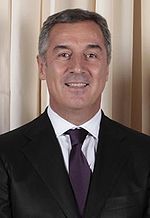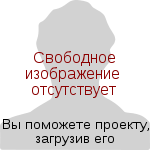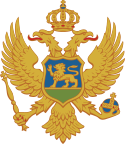- Montenegrin parliamentary election, 2009
-
Montenegrin parliamentary election 
2006 ← March 29, 2009 → 2013 All 81 seats to the Skupština Crne Gore Majority party Minority party 

Leader Milo Đukanović Srđan Milić Party DPS/SDP SNP CG Last election 43 (41 DPS-SDP & 2 BS) 8 (11 in coalition) Seats won 48 16 Seat change +5 +8 Popular vote 168,290 54,545 Percentage 51.94% 16.83%
File:Parl2009Mont.png
Map showing winning parties in each municipality.
PM before election
Elected PM
Montenegro 
This article is part of the series:
Politics and government of
MontenegroConstitution- Parliament
- Speaker
Judiciary- Supreme Court
- Constitutional Court
Executive- Democratic Party of Socialists
(DPS) - Social Democratic Party (SDP)
- Movement for Changes (PzP)
- New Serb Democracy (NSD)
- Socialist People's Party (SNP)
- Democratic Union of Albanians
(DUA) - Democratic League in Montenegro
(DSCG) - FORCA
- Albanian Alternative (AA)
- Croatian Civic Initiative (HGI)
- Bosniak Party (BS)
Divisions- EU accession
- NATO accession
Pre-term parliamentary elections in Montenegro were scheduled by President of Montenegro Filip Vujanović on 27 January 2009 by the Decree of Scheduling Elections for the Assembly of Montenegro, in accordance with Article 92 point 5 of the Montenegrin Constitution[1]:
“ The President of Montenegro schedules elections on the first day after dismissing the parliament. ” ..and Article 95:
“ The President of Montenegro [..] 4) dismisses the Assembly ” As well as Article 13 point 1 of the Law on the Election of MPs[2]:
“ Elections for Members of Parliaments are scheduled by the President of the Republic of Montenegro. ” ..and Article 15 of the same law, point 1st:
“ In case of dismissing the Republic's Assembly or deciding to shorten the term of the Assembly of the Republic, the President of the Republic schedules elections the day after the day of its dismissal, that is the day after the day of the decision to shorten its term's implementation. ” The elections were scheduled, in accordance to the law, after the Parliament of Montenegro decided on 26 January 2009 to shorten its term in accordance to the Proposition of the Government of Montenegro, although not without a huge dose of controversy. The Constitutional Act that proclaimed the new Constitution in 2007 stipulated that the elections had to be held by the end of 2009[1]:
“ The Elections for MPS of the Assembly of Montenegro will be held until the end of 2009 the latest. ” The application of electoral lists lasted from 16 February to 4 March 2009, and the election silence began on 27 March 2009.[3] The elections for the unicameral Assembly of Montenegro was held on 29 March 2009, the same time as the local elections in Nikšić and Budva and the elections for Municipal Presidents of Herceg Novi and Tivat.[4] These were the eighth parliamentary elections since the (re)introduction of multi-party system in 1990, and the second since regaining full independence in 2006.
According to the Ministry for Informational Society, there is a total of 494,289 eligible voters in Montenegro, although it has to be noted that there is a lack of definition of who precisely has the right to vote. The number of MPs being elected on the election was uncertain, because the matter was never solved before scheduling the election. According to calculation (one MP on every six thousand eligible voters), the number of MPs should be 82, while the country's supreme legal act – the Constitution – stipulates 81 (present outgoing session), and the latter was the number of MPs actually elected in March 2009.
The pre-electoral process have been marked by several major incidents, among them the revocation of citizenship of the President of the People's Party Predrag Popović [5] and the violation of the human right to work during the formation of the Coalition Treaty of Prime Minister Milo Đukanović's ruling coalition, according to which party affiliation will be a criterion for employment, all together followed by repeated protests[6] of discontent workers pushed into poverty.[7] All National Councils of the minority communities in Montenegro, who form together the majority of the country's population, have unanimously declared the forthcoming parliamentary elections illegal and contradictory to the Constitutionally-guaranteed rights to ethnic communities in Montenegro. On the national media, only the ruling coalition will be politically presented to the viewers, because of the others' debt.
Contents
Electoral system
Montenegro has a single national voting district, meaning that all votes cast at individual voting stations across the country are summed up together into one result. The electoral threshold is 3%, meaning that electoral lists (whether individual political parties, coalitions or civic groups) that received under three percent of the total votes cast, are crossed out, and the MPs within the assembly are split amongst the remaining lists. The seats are distributed by D'Hondt's method, which slightly favors leading lists in the election above the smaller ones. Elections in Montenegro are free, with the secret ballot guaranteed. The Parliament's mandate lasts four years.
Electoral Lists
- Coalition for a European Montenegro: Milo Đukanović
- New Serb Democracy: Andrija Mandić
- Socialist People's Party of Montenegro: Srđan Milić
- Movement for Changes: Nebojša Medojević
- National Coalition: Predrag Popović and Ranko Kadić
- For a Different Montenegro: Goran Batričević
- Democratic Centre
- Liberal Party of Montenegro
- Serbian People's List: Momčilo Vuksanović
- Party of Serb Populists
- Party of Serb Radicals
- Montenegrin Communists
- Pensioners' Party
- Bosniaks and Muslims
- Party of Democratic Prosperity
- Serbian Homeland Party
- Albanian minority parties
- Albanian List: Mehmed Bardhi and Gjergj Camaj
- New Democratic Power – FORCA
- Democratic Union of Albanians
- Albanian Coalition – Perspective
Results
The Coalition for a European Montenegro won an absolute majority of seats the Parliament of Montenegro on a turnout of 66 per cent.[8] Milo Đukanović secured a sixth term as the Prime Minister.[9][10]
Summary of the 29 March 2009 Assembly of the Republic of Montenegro election results List Votes % Seats +/– Main Albanian European Montenegro – Milo Đukanović (Европска Црна Гора – Мило Ђукановић) 168,290 51.94 47 1 +5 SNP – Socialist People's Party of Montenegro – Srđan Milić (СНП – Социјалистичка народна партија Црне Горе – Срђан Милић) 54,545 16.83 16 — +8 New Serb Democracy – Andrija Mandić (Нова српска демократија – Андрија Мандић) 29,885 9.22 8 — +8 Movement for Changes – We Can – Nebojša Medojević (Покрет за промјене – Можемо – Небојша Медојевић) 19,546 6.03 5 — –6 People's Coalition – People's Party and Democratic Serb Party (Народњачка коалиција – Народна странка и Демократска српска странка) 9,448 2.92 0 — –3 Coalition of the Liberal Party and the Democratic Centre – "For a Different Montenegro" – Dr Goran Batrićević (Коалиција Либералне партије и Демократског центра – „За другачију Црну Гору“ – др Горан Батрићевић) 8,777 2.71 0 — –1 Party of Pensioners and Disabled People of Montenegro (Странка пензионера и инвалида Црне Горе) 7,691 2.37 — — — UDSH – DUA Ferhat Dinosha (UDSH – ДУА Ферхат Диноша) 4,747 1.46 — 1 ±0 Serb National List (Српска национална листа) 4,291 1.32 0 — –2 "Bosniacs and Muslims Together, as One" („Бошњаци и Муслимани заједно, једно“) 3,489 1.08 — — — FORCA – Nazif Cungu (ФОРЦА – Назиф Цунгу) 2,939 1.91 — 1 +1 Albanian List: Democratic League in Montenegro – Mehmet Bardhi & Albanian Alternative – Gjergj Camaj (Албанска листа – Lista Shqiptare: Демократски савез у Црној Гори – Lidhja Demokratike në Mal të Zi – Мехмет Бардли & Албанска алтернатива – Alternativa Shqiptare – Ђерђ Чамај) 2,898 0.89 — 1 –1 "Albanian Coalition – Perspective" („Албанска коалиција – Перспектива“ "Koalicioni Shqiptar – Perspektiva") 2,619 0.81 — 1 +1 Fatherland Serbian Party – Docent Dr Aleksandar Stamatović – "For the True Serbs" (Отаџбинска српска странка – Доцент др Александар Стаматовић – „За истинске Србе“) 2,446 0.75 — — — Montenegrin Communists (Црногорски комунисти) 1,594 0.49 — — — Party of Democratic Prosperity (Партија демократског просперитета – Partia e Prosperitetit Demokratik) 805 0.25 — — — Valid votes 323,990 100 76 5 Total (turnout 66.19%; –5.18%) 329,818 References
- ^ a b Official Paper of Montenegro, n. 1/2007
- ^ Official Paper of the Republic of Montenegro, n. 46/02
- ^ http://www.mtsmondo.com/news/vesti/text.php?vest=122570
- ^ http://snp.co.me/vijesti.asp?kat=11&id=3264
- ^ http://in4s.net/x/index.php?option=com_content&view=article&id=5952:lider-narodne-stranke-crne-gore-gubi-crnogorsko-dravljanstvo&catid=67:drugi-pisu&Itemid=192
- ^ http://in4s.net/x/index.php?option=com_content&view=article&id=6025:sezona-trajkova-dogorelo-do-vlade&catid=58:cg&Itemid=181
- ^ http://in4s.net/x/index.php?option=com_content&view=article&id=6064:traimo-samo-svoje&catid=58:cg&Itemid=181
- ^ Djukanovic's bloc wins absolute majority in snap poll
- ^ Milo Djukanovic wins a sixth term with 50,8% of the vote
- ^ Rezultati izbora – Crna Gora – 2009
Further reading
- Analysis by the International Institute for Middle East and Balkan studies
- Analysis by the French Robert Schuman Foundation
External links
- The Electoral Commission
- Check of the Electoral List
- The Center for Monitoring CEMI
- The Center for Democratic Transition
 Elections and referendums in Montenegro
Elections and referendums in MontenegroParliamentary elections Presidential elections Municipal elections Referendums For the period 1918-1945, see Elections in Yugoslavia. Categories:- Elections in Montenegro
- Politics of Montenegro
- 2009 elections in Europe
- 2009 in Montenegro
- Parliament
Wikimedia Foundation. 2010.
